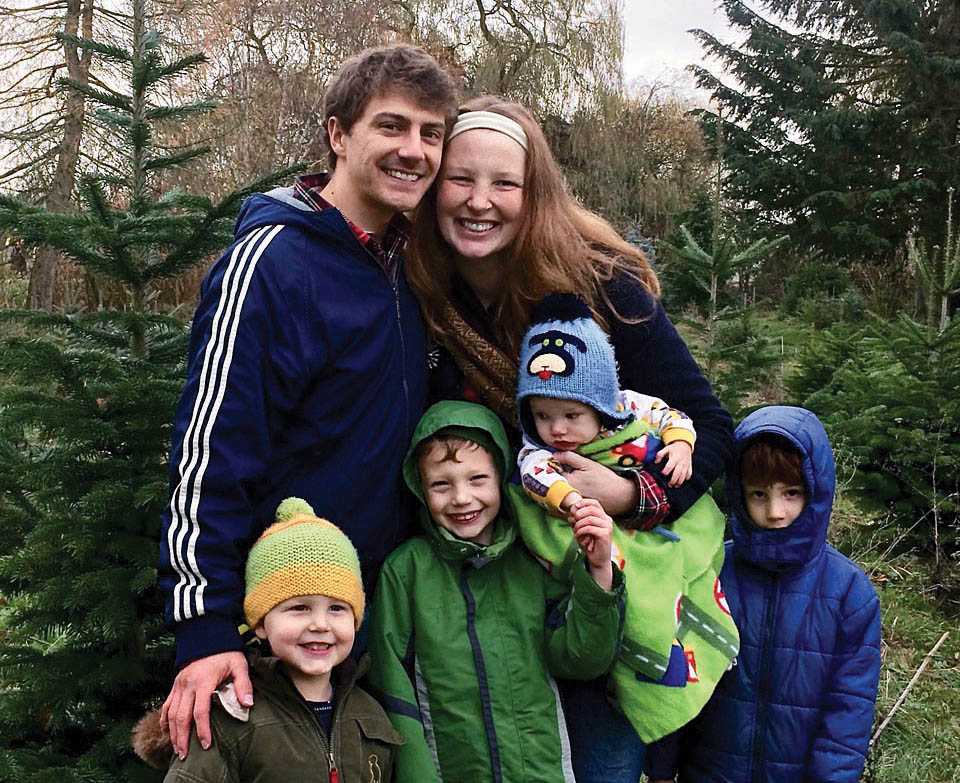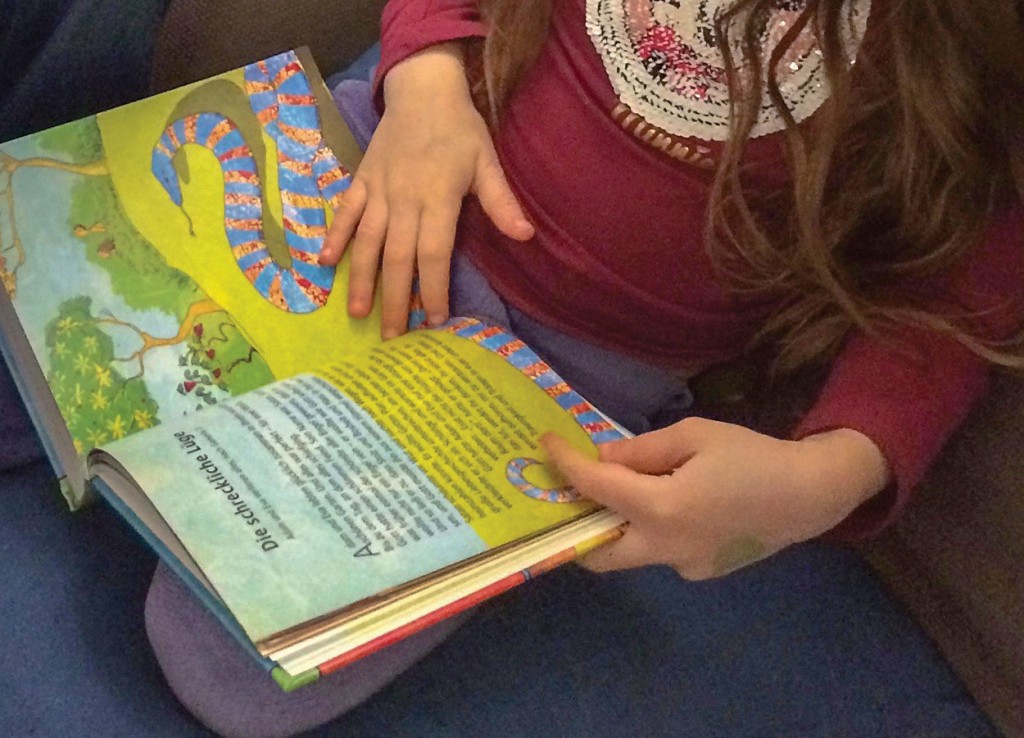You have free articles remaining this month.
Subscribe to the RP Witness for full access to new articles and the complete archives.
Spread out across a section of a huge lawn in the wooded park, a small group was beginning to gather: a couple of mothers standing with their arms casually crossed and chatting; teachers welcoming parents and setting out snacks on the patchwork of blankets; small children of various ethnicities running back and forth from the towering play structure, squealing and calling after each other in German—only pausing to give brief but cheerful greetings as they saw their parents arrive. This summertime picnic for the families of the kindergarten provided a rare opportunity for parents to meet each other. No one sat down yet, except for one mother, with her baby, at the edge of a blanket.
In recent years there has been a significant influx of people seeking asylum in Europe after escaping the dangers of civil war, government unrest, Islamic militants, religious persecution, and other problems plaguing Middle Eastern and Northern African countries. In Germany, where the population is approximately 80 million, more than 1.6 million people have applied for asylum since 2015.
This is a challenge for the German government—putting a strain on the country’s generous social programs, too—and has resulted in a tightened stance on immigration across the European Union. But for followers of Jesus, this major upheaval has presented an extraordinary opportunity to share the gospel with unreached people from countries that remain closed.
Our family came to Germany at the beginning of 2018. We had moved from our little blue house and dear church community in Beaver Falls, Pa., in response to God’s calling to join the work He is doing among the nations currently represented in Germany. With existing family ties here, we understand some of the complicated dynamics in the society and are eager to hold out the hope of Christ as the only source of true and lasting peace.
We live on the edge of Frankfurt in an area where immigrants and refugees now live alongside Germans who have always been here—including adults who grew up playing on the rubble yet to be cleared from World War II. We serve with Mission to the World and are members of a multicultural church-planting team, focusing initially on the slow-but-steady groundwork of making contacts among our neighbors of all backgrounds. We are also building in-home community groups where we study the Bible with people who are exploring its truths for the first time.
In becoming immigrants ourselves in a country our families emigrated from only a couple of generations ago, we are in a unique position to meet and relate with both Germans and refugees. We have been delighted and encouraged by people’s interest as we have shared our faith and our lives, while we learn the language and adapt to a culture that is new for us, too.
______________________________________
Holding my baby in front of me on that sunny picnic day, I approached the woman on the blanket and gave a friendly hello as if to say, “Hey, we both have babies!” She in turn motioned, welcoming me to join her and sit. Giving my well-rehearsed disclaimer that I had only lived in Germany for a few months, I continued the conversation timidly. After some time, I discovered she had also come in recent years.
Speaking a fragmented version of German, each of us introduced ourselves and shared about our families. We discovered that our infants were born a week apart in the same hospital. Nearby, Nick tried to engage the father of this family, who gave a polite response but was otherwise aloof. His wife was the opposite. She was happy to be talking, and it became clear that these kinds of disjointed exchanges were familiar to her, too; we smiled frequently, moving abruptly through different topics as either person’s mastery of specific vocabulary ran out (or was misunderstood).
Though Christianity is technically considered the primary religion in Germany, pragmatically most Germans today are agnostic. Only 2 percent profess to be evangelical Christians. Placing a high value on tradition, though, and still claiming Christian roots, a majority of Germans hold church membership in state-sponsored Protestant and Catholic churches but don’t regularly attend services. Across the board, state churches have been experiencing steep decline in recent years as young people sever nominal ties and remove themselves from the rolls, also avoiding the church tax levied on members.
Germans who trust in Christ for salvation and transformation are among those involved in state churches. But because sound teaching varies depending on the region and each individual church, a number of free churches not affiliated with the government are also springing up. Even so, despite the country’s rich history of the Reformation, spiritual darkness is a crushing reality. By simply living everyday life as followers of Christ, we have seen ways that God is working through us to draw people out of darkness into light.
Standing by the window to our second-floor apartment, my new friend from the picnic looked out and happily exclaimed, “Ahh! My brother!” I looked down and saw Nick bending over and walking beside her oldest daughter as she took a turn learning to ride our colorful hand-me-down children’s bike on the sidewalk. We had stayed upstairs to nurse our babies while Nick took the bigger kids outside.
We had been talking for hours in broken German about our extended families, home countries, and backgrounds. I shared that we follow Jesus, and she said she was Muslim, as we had suspected. Though we had invited the whole family to spend time with us, it was not a surprise that the father did not accompany his family. It was also understandable when his wife shared that he had not been doing well since being uprooted and was facing discouragement and depression.
“My brother!” she cried out again, obviously struck by something—a memory? In my mind I replayed our recent conversation, and I quickly tried to recall if she had said something about a brother. Or a bike? It took me longer than I care to admit before I finally realized it was Nick’s kindness toward her daughter that impacted her: he was the brother!
After more time snacking, talking, and letting the kids play together, we said our goodbyes. As she was leaving she thanked me, saying, “I’m so glad to meet you, my sister. I have had no friends in Germany and have been alone. But now I have you!”
When someone is displaced, regardless of the reason, making connections and forming friendships is vital. Nick and I can relate to this in a small way with other immigrants and refugees as we find our place here. As people first arrived from areas of the world that are completely closed to the gospel, churches in Germany experienced a flood of curious, searching Muslims who had become disenchanted with Islam. Through their upheaval, people have come to faith in Christ. Over time, however, initial enthusiasm wanes and unmet needs remain when converts lack the encouragement of intentional discipleship and incorporation into the body of Christ.
Just as relationships can be key for a new believer’s thriving, relationships are key in being able to engage with others here who are surprisingly open to learning about the Jesus of the Bible. A colleague in Germany, a former Muslim who has been sharing Christ with Muslims for over 30 years, describes a recent shift towards this openness in many parts of the Muslim world: “If I told them I was a Christian 40 years ago, they would’ve come after me.” But now, discussions are possible as people assure him regarding Islam, “We don’t believe that stuff anymore.” In some cases, identifying as Muslim only represents a cultural marker, without personal faith or even a meaningful knowledge of the religion. And in Germany, there is a willingness among Muslims to explore different viewpoints while figuring out their lives in a new context.
At one point after my “sister” and her children came to our house, Nick was picking up the kids from kindergarten at the same time as the dad of the family, like they had dozens of times before. But this time, instead of being disengaged, the dad greeted Nick with a big smile: “Hello! My wife calls you brother! Thank you!”
Since then, whenever either of us meets him—on the bus, on the street, coming back from the city—he offers an endearing ear-to-ear grin and waves enthusiastically. Once, when he and Nick were riding the same tram coming home from evening language classes, he unexpectedly invited Nick to the room that is their home for a late-night second dinner, insisting then that his daughters call Nick “uncle.” This significant change in his behavior and outlook has reminded us that the impact of feeling connected should never be underestimated.
Over time, these connections are directly able to become inroads for the gospel. Around Christmastime, we gave this family’s oldest daughter a copy of The Jesus Storybook Bible in German, explaining that it can help adults practice German but that it is also very important because it has stories from the Bible about how God loves us through Jesus. A few weeks later, she brought her storybook Bible to the secular kindergarten where she had a teacher read everyone the story of Jonah, called “God’s Messenger.” This story clearly explains the foreshadowing of Jesus, a greater messenger who Himself is the message.
Resources
Bundesamt für Migration und Flüchtlinge
Eurostat (now includes 2018 to match BAMF report)
Joshua Project (statistics on religion and unreached people groups within Germany)
Nick and Theresa Bloom (with their sons Levi, Jonah, Mac, and Elias) are members of Eastvale (Beaver Falls, Pa.) RPC. They are currently serving with Mission to the World on a multicultural church-planting team.

